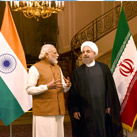Tougher US Sanctions against Iran: Global Reactions and Implications
US President Barak Obama recently signed a tougher sanctions law against Iran in a continuing bid to coerce Tehran into abandoning its nuclear programme. This Backgrounder discusses the reactions of the emerging powers to the new sanctions and their implications.
- M. Mahtab Alam Rizvi |
- February 28, 2012 |











